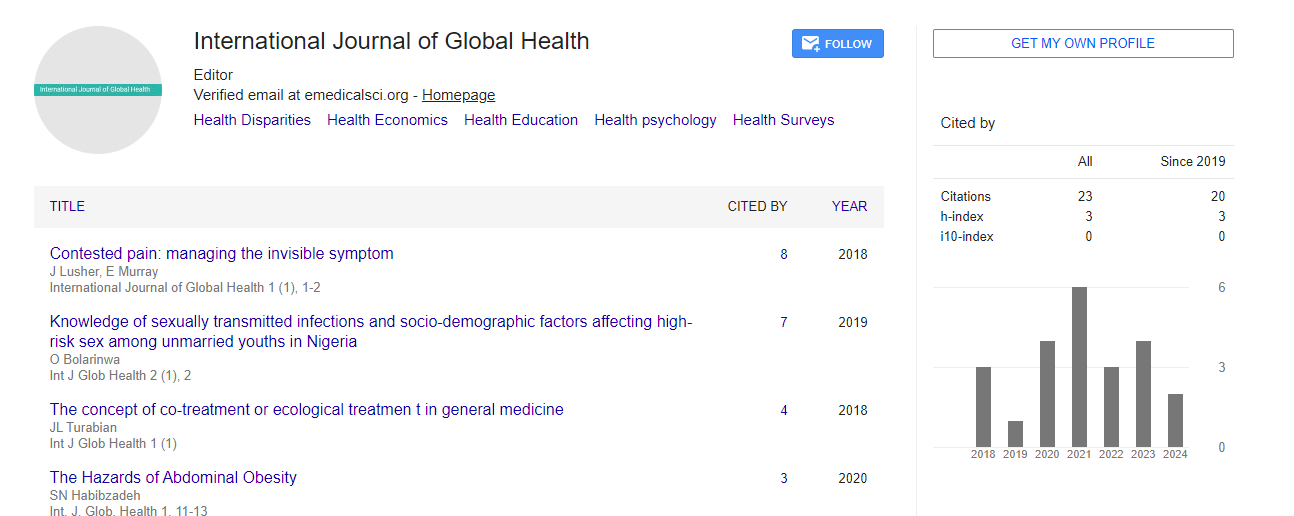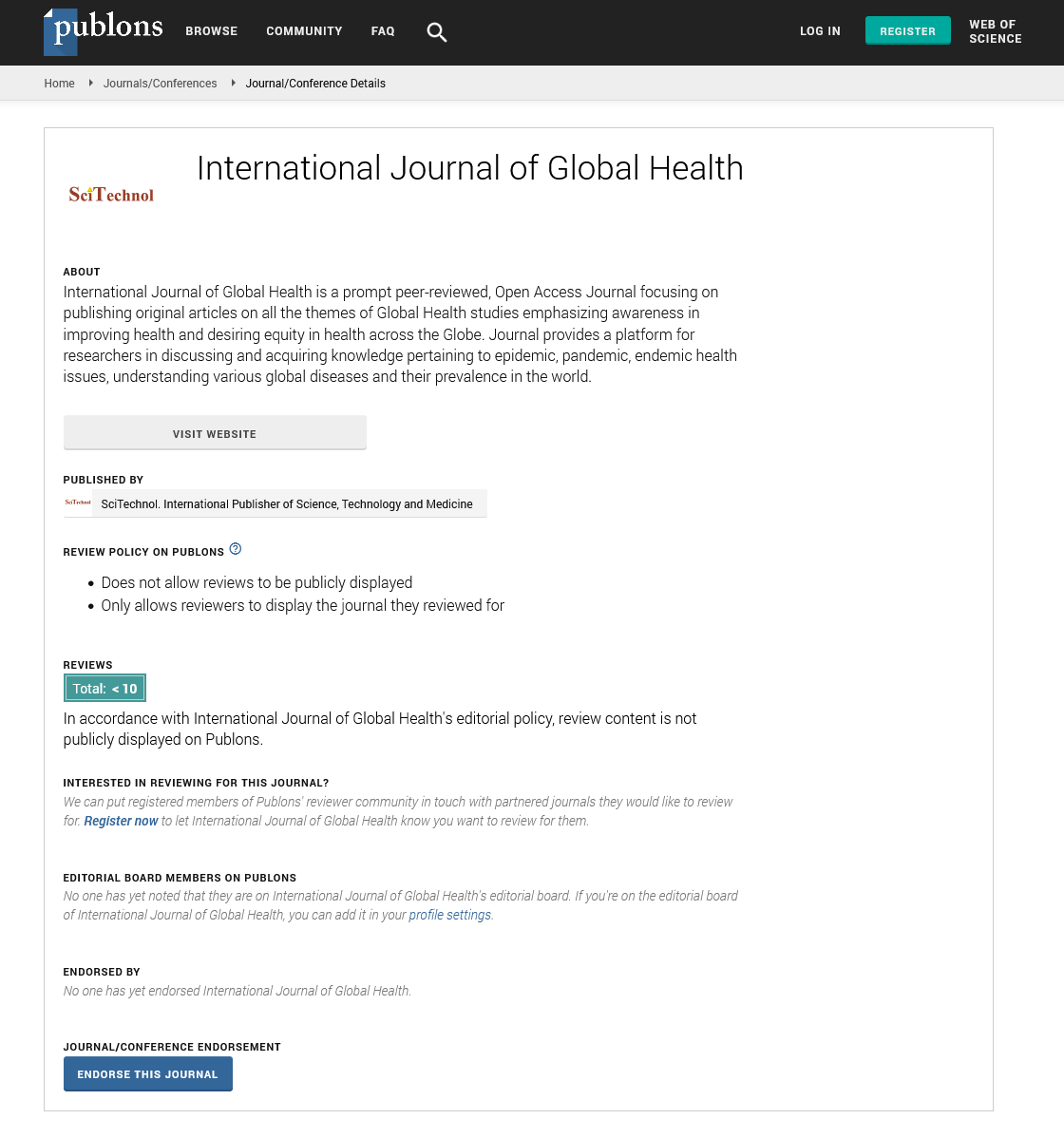Opinion Article, Int J Glob Health Vol: 6 Issue: 2
Humanitarian Crisis: Responding to Urgent Needs and Restoring Hope
Wanqi Yanru*
1Department of Health Care, Nanjing University, Nanjing, China
*Corresponding Author: Wanqi Yanru,
Department of Health Care, Nanjing University, Nanjing, China
E-mail: yanru@wan.cn
Received date: 24 May, 2023, Manuscript No. IJGH-23-107359;
Editor assigned date: 26 May, 2023, PreQC No. IJGH-23-107359 (PQ);
Reviewed date: 09 June, 2023, QC No. IJGH-23-107359;
Revised date: 16 June, 2023, Manuscript No. IJGH-23-107359 (R);
Published date: 23 June, 2023 DOI: 10.4172/Ijgh.1000183
Citation: Yanru W (2023) Humanitarian Crisis: Responding to Urgent Needs and Restoring Hope. Int J Glob Health 6:2.
Description
Humanitarian crises have become an unfortunate reality in the interconnected world, impacting millions of lives and causing immense suffering. These crises, which include conflicts, natural disasters, epidemics, and displacement, require urgent and coordinated responses to address immediate needs and restore hope for affected populations. This study, will delve into the nature of humanitarian crises, the challenges they pose, and the essential components of an effective humanitarian response.
Understanding humanitarian crises
Humanitarian crises arise from situations that threaten the lives, safety, and well-being of a significant number of people. They can be triggered by armed conflicts, political instability, natural disasters, epidemics, or a combination of factors. These crises often result in displacement, loss of infrastructure, disruption of essential services, and limited access to healthcare, food, water, and sanitation. The most vulnerable populations, including children, women, the elderly, and those with disabilities, are disproportionately affected..
The urgency of response
Timely and effective responses are critical during humanitarian crises to save lives, alleviate suffering, and protect the rights and dignity of affected populations. Humanitarian organizations, governments, and international actors collaborate to provide emergency assistance, deliver essential supplies, and restore critical services. The urgency of response is vital to address immediate needs, prevent further deterioration of the situation, and establish a foundation for long-term recovery and resilience.
Components of an effective humanitarian response
Needs assessment: Conducting thorough needs assessments is necessary to understand the specific needs and vulnerabilities of affected populations. This assessment helps guide the allocation of resources, prioritize interventions, and ensure that assistance is tailored to address the most urgent needs.
Emergency relief: Providing emergency relief is a primary focus during the early stages of a humanitarian crisis. This includes the delivery of life-saving supplies, such as food, water, shelter, healthcare, and sanitation facilities. Emergency relief efforts also prioritize the protection of vulnerable groups, including children, women, and displaced persons.
Coordination and collaboration: Effective coordination and collaboration among humanitarian actors are essential to maximize the impact of relief efforts. International organizations, governments, local communities, and non-governmental organizations work together to ensure a unified and comprehensive response, avoiding duplication of efforts and addressing gaps in assistance.
Healthcare and medical assistance: Access to healthcare services is vital during humanitarian crises, as the risk of disease outbreaks and inadequate healthcare infrastructure can exacerbate the suffering of affected populations. Establishing mobile clinics, deploying medical teams, and ensuring the availability of essential medicines and supplies are critical components of a humanitarian response.
Protection and human rights: Humanitarian responses must prioritize the protection of affected populations and respect their human rights. This includes safeguarding the rights of women and children, preventing gender-based violence, ensuring access to education and safe spaces for children, and addressing the specific needs of marginalized groups, such as refugees and internally displaced persons.
Long-term recovery and resilience: While addressing immediate needs is necessary, humanitarian responses should also consider long-term recovery and building resilience. This involves supporting livelihoods, rebuilding infrastructure, promoting education, and providing psychosocial support to restore hope, dignity, and self- sufficiency for affected populations.
Challenges in humanitarian crises
Humanitarian crises are fraught with numerous challenges that complicate response efforts. Some key challenges includes
Access and security: Humanitarian actors often face difficulties in accessing affected populations due to armed conflicts, political instability, or logistical constraints. Ensuring the safety and security of aid workers is essential to deliver assistance effectively.
Funding constraints: Humanitarian responses require significant financial resources, and securing adequate funding can be a challenge. Funding constraints can hinder the scale and effectiveness of response efforts, impacting the well-being of affected populations.
Coordination and communication: Coordinating efforts among multiple actors and ensuring effective communication can be complex, particularly in large-scale crises involving numerous organizations, governments, and local communities. Streamlining communication channels and establishing clear lines of coordination are critical.
Sustainable solutions: Humanitarian responses often focus on immediate needs, but sustainable solutions are necessary to address the root causes of crises and promote long-term stability. This requires collaboration with governments, development agencies, and local communities to address underlying factors such as poverty, inequality, and political instability.
Conclusion
Humanitarian crises demand urgent, coordinated, and comprehensive responses to address the immediate needs of affected populations and restore hope for a better future. By conducting needs assessments, providing emergency relief, coordinating efforts, protecting human rights, and fostering long-term recovery, humanitarian actors contribute to alleviating suffering and rebuilding shattered communities. While challenges persist, the commitment to humanitarian principles and collaborative efforts can make a significant difference in saving lives, restoring dignity, and promoting resilience in the face of adversity.
 Spanish
Spanish  Chinese
Chinese  Russian
Russian  German
German  French
French  Japanese
Japanese  Portuguese
Portuguese  Hindi
Hindi 
